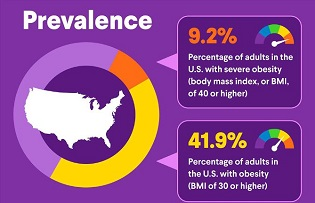Treatment and Goals
Care and Continuity
Care and Continuity
As a chronic disease, obesity is a long-lasting condition that can be managed. Below is an overview of healthy habit recommendations and options you can discuss with your health care professional.
Setting Realistic Weight-Management Goals
At the beginning of your obesity journey, try setting a modest goal — say, 5%-10% weight loss over the course of six months. This amount of weight loss has been shown to provide benefits in many obesity-related complications, including diabetes, high blood pressure, and non-alcoholic fatty liver disease. Once you meet that goal, you and your health care professional can set a new one.
Losing a lot of weight may require setting new goals multiple times. By working with your health care professional, you can establish realistic goals that will produce results and motivate you to succeed.
Patient Support Groups
Living with obesity can be hard. So, too, can trying to lose weight. Patient support groups offer the opportunity to be part of a community of peers facing similar challenges as you. These groups are a great resource for emotional support, informational education, practical advice, motivation, and empowerment. View our curated list of patient support groups here.
Mental Health and Behavioral Interventions and Therapies
Managing your weight isn't easy, but it is possible. The key is to adopt behavioral habits that make it easier for you to eat a healthy diet and bring more physical activity into your everyday life. A process known as "behavioral therapy" can help.
Behavioral therapy is the name for a wide range of behavior changes. It's a form of self-care that focuses on adjusting your ingrained lifestyle habits, especially those related to eating and physical activity. The aim is to give you the tools you need to make better choices. With practice, you can learn how to use these tools and incorporate them into your life.
Here are some examples of behavioral therapy techniques that can enrich your journey. Some people are able to do these on their own. Others may need assistance from a therapist, health coach, or other health care professional.
- Self-monitoring: Record the food you eat and daily activity in a food and activity journal. There are many fantastic mobile apps and websites that can help you with this task. Many of these options have a large activity and food database and barcode scanner to make this process quick and easy.
- Goal setting: Set realistic goals that motivate you to succeed with healthy eating and exercise. Studies have shown that even a 5% loss of total body weight can have tremendous health benefits. A realistic goal is losing 5%-10% of total body weight in six months.
- Education: Learn about healthy eating, physical fitness, weight management, chronic disease management, behavior change, and other useful topics. It may be hard to navigate all of the resources that exist and find the right one for you. Some helpful sites may be found through support groups here.
- Stimulus control: Identify things that trigger overeating (like watching TV or eating out) and manage them through awareness and behavior replacement (like chewing gum instead of eating while watching TV or putting half of your restaurant food in a to-go container before starting to eat). Another great tip: Remove unhealthy snack foods from your house and only buy them for special occasions, like a party or holiday.
- Behavioral substitution: Substitute an overeating behavior with a healthier behavior. For example, when you feel stressed, go for a walk instead of snacking.
- Problem-solving strategies: Pinpoint problematic behaviors, brainstorm potential solutions, and give those solutions a try. For instance, suppose you're having trouble motivating yourself to exercise. You might ask a trusted friend to help you come up with enjoyable ways to include more activity in your life. Or, simply try doing more of what you like. If you enjoy dancing, join a Zumba class. If you used to swim a lot, join a center with a pool and schedule pool time into your weekly calendar.
- Stress-management strategies: Stress can have a significant impact on your health. Learning stress-management strategies can reduce the stress you feel so you can focus on your health. Meditation, mindfulness, yoga, exercise, and adequate sleep (at least 7.5 hours a night) are methods that can help you reduce stress.
- Cognitive restructuring: Replacing distorted thinking with a more realistic perspective can change how you think about yourself and your weight-management plan. For example, if you’re thinking "I'll never lose weight," you should examine why thoughts like these are occurring, identify what feelings are associated with these thoughts, and consider how to replace upsetting or negative thoughts. Avoid having unrealistic expectations for yourself that you would not place on others. Ultimately, it may be better to focus on health goals rather than the number on the scale. If you’re struggling with how you think about your weight loss journey, seek out support from a mental health professional.
- Seeking social support: Look for support from relatives and friends who believe in you and want to help you achieve your goals.
- Seeking support from mental health professionals: Consult with mental health professionals such as psychologists, social workers, or psychiatrists who will help you work on depression, eating disorders, self-esteem issues due to weight bias, anxiety, or any other problems you may have. Obesity and mental health are connected, and it may be difficult to achieve success in obesity treatment without mental health treatment. You may need counseling, medication, or both, and it's important to discuss the impact of treatment on your overall health.
Taking Steps to Reduce Chronic Disease Risk
Healthy eating and physical activity are two excellent ways to reduce your risk of developing chronic diseases. However, depending on your health risks, your health care professional may also recommend other chronic-disease prevention strategies. Examples include:
- Quitting smoking and avoiding secondhand smoke
- Drinking less alcohol
- Getting more sleep
- Having health screening tests
- Managing stress
- Addressing mental health issues
Need extra support? Ask your health care professional to refer you to a behavioral health specialist.
Did You Know?
Sleep
- Research has found that not getting enough sleep at night can cause metabolic changes that may be linked to obesity.
- Obesity is the No. 1 risk factor for developing obstructive sleep apnea (OSA), and weight loss is the most effective treatment for OSA. For some people, weight loss can cure OSA.
Trauma
- Women who experienced childhood trauma or sexual abuse, or who were raised by a parent who misused alcohol or drugs, have higher rates of obesity than those without a traumatic childhood.
Healthy Eating
Eating a healthy diet that includes nutrient-rich foods in right-size portions is one of the best changes you can make for your weight and health. Be sure to keep open communication with your health care professional if you're having difficulty with finding a diet or meal plan. They can help develop a personalized and sustainable meal plan that takes into account your specific needs, preferences, and health goals.
Need extra support? Ask your health care professional to refer you to a registered dietitian or health educator.
Did You Know?
Dietary Guidance
- 1980 was the first year that the federal government published its Dietary Guidelines for Americans. The government's goal was to educate Americans on the links between nutrition and disease prevention. The most recent update is for 2020-2025.
- Researchers have identified certain intestinal bacteria that are associated with obesity. Learning more about these bacteria could lead to new obesity treatments in the future.
Physical Activity
Physical activity including exercise, increases how much energy (i.e., calories) the body uses. It provides many other benefits too, such as lower blood pressure, improved cholesterol levels, better heart health, stronger bones and muscles, better sleep, and improved mood. By getting moving, you help yourself in multiple ways.
It's important to remember that you should complement physical activity with a balanced diet, lifestyle modifications, and, if necessary, professional guidance to achieve optimal results in managing obesity. Keep open communication with your health care professional if you're struggling to find a physical activity to stick to. They can provide guidance on how much exercise you can do, what types of activities are best for you, and what types of exercise to avoid because of physical limitations or other factors.
Need extra support? Ask your health care professional to refer you to a physical therapist or medical exercise program.
Weight-Management Medications
If you have stage 2 or stage 3 obesity, your health care professional may bring up the possibility of taking prescription weight-management medications. Medicine can complement healthy eating and physical activity. If you have certain weight-related chronic health conditions or have been unable to lose weight through other means, combining medicine with behavioral/lifestyle changes may help.
Obesity is a complex condition influenced by various factors, and different individuals may respond differently to medication. Be honest with your health care professional if you're having trouble remembering to take your medication, can't afford it, are experiencing side effects, or have any other concerns. They can reassess your overall plan, review your current medication regimen, and explore alternative options or adjustments.
Obesity Surgery
A healthy eating plan, physical activity, and behavior changes are crucial parts of any treatment plan. If you have stage 3 obesity, your health care professional may also talk with you about taking weight-management medications and/or having surgery (also known as bariatric surgery).
Any type of surgery is a major medical procedure. It requires considerable planning, recovery time, and lifestyle changes. That's why health care professionals recommend surgery only when its potential benefits outweigh its possible risks. By understanding the risks, benefits, and potential outcomes, you and your health care professional can make an informed decision about whether surgery is the right choice for you in managing your obesity.
Reevaluation/Restaging
Obesity staging is a metric that health care professionals use to describe the extent to which your weight affects your overall health. Determining your stage of obesity can help guide the discussions you and your health care professional have about your weight-management goals and treatment plan.
Over time, losing weight may eliminate or reduce your risk for various weight-related complications. In this case, your health care professional may reclassify your obesity as a different stage. This, in turn, may impact your treatment plan. For instance, moving from stage 2 to stage 3 may make you a candidate for a different or additional medication or treatment option.
Maintenance

Maintaining an obesity treatment plan requires dedication and effort. Rough patches are common and expected but your health team is there to help and guide you. Below are key strategies for sustaining your progress and continuing your journey toward better health:
- Consistency: Stay consistent with the healthy habits and lifestyle changes that you initially implemented during your treatment plan. This includes adhering to a balanced diet, engaging in regular physical activity, and keeping open communication with your health care professional.
- Regular monitoring: Continue monitoring weight, body measurements, and other relevant health parameters to stay aware of progress and make any necessary adjustments. Regular self-monitoring helps identify potential challenges or patterns and allows for timely intervention.
- Support system: Surround yourself with a supportive network of friends and family or a support group that can offer encouragement and accountability. Sharing experiences, challenges, and successes with others on a similar journey can help you maintain motivation and provide a sense of community.
- Behavior modification: Address any underlying emotional or psychological factors that may contribute to overeating or unhealthy habits. Continually work on developing and implementing strategies to manage triggers, cope with stress, and promote positive behavior change.
- Flexible approach: Recognize that there may be ups and downs along the way. Know that what works for one person may not work for another, and trying one strategy that was not effective for you is not considered failure. Be flexible and adaptable to life's challenges. Aim for progress rather than perfection. And through shared decision-making with your health care professional, make adjustments as needed while staying committed to your long-term goals.
- Long-term mindset: Embrace the idea that maintaining a healthy weight is a lifelong journey. Prioritize sustainable changes over quick fixes.
- Professional support: Maintain regular follow-up appointments with your health care professional. They can provide personalized advice, help address any concerns or obstacles, and offer additional resources if needed. Don't be afraid to reach out to your health care professional if you're struggling to maintain your goals — you're not alone and they're there to help you stay on track.
- Celebrate success: Celebrate your achievements, both big and small, as this can reinforce motivation and help you maintain a positive mindset.
Remember: Achieving and maintaining a healthy weight is a lifelong challenge. By working with a health care professional you trust, surrounding yourself with supportive people, and staying positive, you can increase your chances of long-term success.
Thank You





 DOWNLOAD
DOWNLOAD




